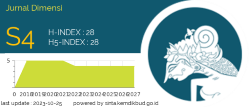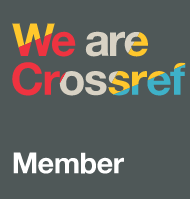EXPLORING THE SELF-CONFIDENCE OF SIXTH SEMESTER STUDENT PRESENTING PROPOSAL DURING THE PROPOSAL SEMINAR COURSE
Abstract
Full Text:
PDFReferences
Sinaga, J. B., Eriyanti, R. W., Asih, R. A., In'am, A., & Masduki. (2025). Implementation of Digital Student Worksheet Based on Problem‑Solving to Enhance Students’ Critical Thinking Skills. *Jurnal Pemberdayaan Masyarakat*, 4(1). https://doi.org/10.46843/jpm.v4i1.388
Ahmadi, S. M., & Sadeghi, M. (2016). The effect of metacognitive instruction on speaking self-efficacy and speaking ability of EFL learners. International Journal of Research Studies in Education, 5(3), 99–113.
Celce-Murcia, M. (2017). Rethinking the role of communicative competence in language teaching. In E. Hinkel (Ed.), Handbook of research in second language teaching and learning (Vol. III, pp. 31–45). Routledge.
Rahimirad, M., & Shams, M. R. (2015). The effect of metacognitive strategy instruction on the listening performance of EFL learners. International Journal of Research Studies in Language Learning, 4(1), 29–40.
Seker, M., & Dincer, A. (2019). An insight to speaking strategies of EFL learners. International Online Journal of Education and Teaching (IOJET), 6(2), 432–440.
Teng, F. (2020). Autonomy, agency, and identity in teaching and learning English as a foreign language. English Language Teaching Educational Journal, 2(2), 81–94.
Teng, F., & Zhang, L. J. (2021). Using metacognitive strategies in oral communication: A study of Chinese university EFL learners. System, 96, 102406. https://doi.org/10.1016/j.system.2020.102406
Teng, M. F. (2020). The benefits of metacognitive reading strategy awareness instruction for young learners of English as a second language. Literacy, 54(1), 29–39. https://doi.org/10.1111/lit.12181
Ahmadi, G. A., & Ghonsooly, B. (2016). An exploration of EFL learners’ declarative knowledge, procedural knowledge, and monitoring. International Journal of Educational Investigations, 3(7), 120–128.
Azmi, F., & Gunawan, A. (2021). Academic anxiety and its impact on students’ performance in oral presentations. Journal of Educational Psychology and Counseling, 9(2), 134–145. https://doi.org/10.24127/pep.v9i2.3782
Chen, X., Zhang, L., & Li, Y. (2022). Belief in one's academic abilities and presentation performance among university students. Journal of Educational Development and Practice, 18(1), 55–69. https://doi.org/10.1177/XXXXXX
Chen, Y., & Wu, H. (2022). Effective visual communication in academic presentations: Strategies for student success. International Journal of Educational Technology in Higher Education, 19(3), 1–15. https://doi.org/10.1186/s41239-022-00340-3
Ismail, N., Yusuf, A., & Karim, R. (2019). The role of self-confidence in enhancing academic oral communication. International Journal of Learning, Teaching and Educational Research, 18(6), 212–226. https://doi.org/10.26803/ijlter.18.6.12
Lee, S., & Park, J. (2022). Resilience and confidence: How students cope with academic failure. Asia Pacific Education Review, 23(1), 101–114. https://doi.org/10.1007/s12564-022-09750-0
Mustika, S., & Handayani, N. (2020). The impact of self-confidence on academic speaking performance among EFL learners. Indonesian Journal of English Education, 7(1), 65–78. https://doi.org/10.15408/ijee.v7i1.15341
Rahmawati, D., & Sari, M. (2021). Exploring students' self-confidence in academic oral presentation: A qualitative study. Journal of Language and Language Teaching, 8(3), 198–207. https://doi.org/10.33394/jollt.v8i3.3621
Setyowati, L., Santosa, S., & Widodo, H. (2022). The correlation between self-confidence and academic anxiety in undergraduate presentations. Journal of Psychological Research, 15(4), 134–148. https://doi.org/10.31227/osf.io/xyz123
Smith, A., & Jones, R. (2023). Students’ perception of their presentation skills: The role of self-image and confidence. European Journal of Education and Psychology, 16(2), 45–60. https://doi.org/10.30552/ejep.v16i2.1038
DOI: https://doi.org/10.33373/dms.v13i3.8197
Refbacks
- There are currently no refbacks.

This work is licensed under a Creative Commons Attribution 4.0 International License.











